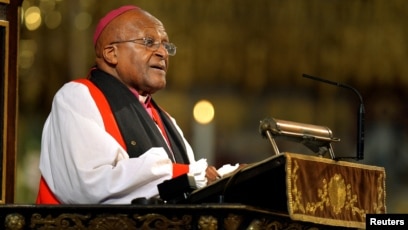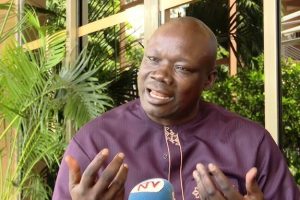The youthful life of Desmond Mpilo Tutu
Being the second son after the death of the first, Tutu grew up in a humble family and he was so close to his father in spite of his heavy drinking that let to beating up his wife that Tutu hated.

His name “Mpilo” which means life was given to him by his paternal grandmother called to him mostly by his older sister.
In 1941, Tutu’s mother moved with him to Witwatersrand to work as a cook. Tutu attended a Methodist primary school before transferring to the Swedish Boarding School (SBS) in the St. Agnes Mission the moved with his father several months later to Emelo, Eastern Transvaal, then returned to Roodepoort west after six months hence resuming studies taking particular interest in Christianity.

During his life, tutu was sickly and in 1947, he contracted tuberculosis for 18 months and by 1929, he returned to school, took his national exams in late 1950 scoring a second-class pass.
career
After his parents failed at affording tuition for him to pursue his medical studies at the university of the Witwatersrand, he opted for teaching earning him a government scholarship at Pretoria Bantu Normal College.
Tutu took on many roles as in school among which included chairing the cultural and debating society which gave him to meet the lawyer and future president of South Africa¬-Nelson Madiba Mandela.

After attaining his Transvaal Bantu teachers Diploma, he started teaching English and history. Tutu courted his sister’s friend called Nomalizo leah and in 1955 they were legally married, lived with Tutu’s Parents’ before moving to their own six months later and having their first child in 1956.
Joining priesthood
when the white minority introduced the Bantu Education Act (whose major provision enforced racially separate educational facilities), Desmond Tutu left the teaching profession and chose to become an Anglican priest, admitted to St. Peter’s Theological College in Johannesburg and studied the Bible, Anglican doctrine, church history and Christian ethics earning him a Licentiate of Theology degree.
Mixing church with Politics
After telling a Danish journalist that he supported an international economic boycott of South Africa, Tutu was called before two government ministers to be reprimanded in October 1979. In March 1980, the government confiscated his passport, bringing him to the spotlight internationally.
In the same year tutu and his friend joe led a protest march leading to there arrest, imprisonment and later fined. This was the start of Tutus direct engaging in politics to defend human rights and fight racial segregation in South Africa angering many white people.
By 1980s Tutu was an icon for many black South Africans, a status rivalled only by Mandela.
Desmond Tutu was informed that he had won the 1984 Nobel Peace Prize, attending the Awards ceremony in December and sharing his US$192,000 prizemoney with his family, SACC staff, and a scholarship fund for South Africans in exile.
South Africa’s first black Bishop of Johannesburg
When Bavin retired as Bishop of Johannesburg, Tutu was among five candidates considered as his replacement. After many barriers from them the white bloc, a bishops’ synod met and decided to give the role to Tutu making him the sixth Bishop of Johannesburg in St Mary’s Cathedral in February 1985 which broght selebrations from black Anglicans angering their white counterparts.
in April 1985, Tutu led a small march of clergy through Johannesburg to protest the arrest of Geoff Moselane.
In October 1985, he backed the National Initiative for Reconciliation’s proposal for people to refrain from work and engage in a day of prayer, fasting and mourning. He also proposed a national strike against apartheid, angering trade unions whom he had not consulted about such an idea.
Frist black archbishop
In February 1986, the Black Solidarity Group formed a plan to get Tutu appointed as a replacement for Philip Russell who had earlier announced his retirement as Archbishop of capetown. In his absentia while in Atlanta, Tutu secured a two-thirds majority from both the clergy and laity and was then ratified in a unanimous vote by the synod of bishops.
His work as archbishop, coupled with his political activism and regular foreign trips, led to him accumulating a vast workload.
In October 1994, Tutu announced his intention to retire as archbishop in 1996 Although retired archbishops normally return to the position of bishop, the other bishops bestowed on him a new title: “archbishop emeritus”.
In October 1994, Tutu announced his intention to retire as archbishop in 1996. Although retired archbishops normally return to the position of bishop, the other bishops bestowed on him a new title: “archbishop emeritus.
In October 2010, Tutu announced his retirement from public life so that he could spend more time “at home with my family – reading and writing and praying and thinking.”
On December 26th 2021, the death of Desmond Tutu was announced by South African President Cyril Ramaphosa
![]()




